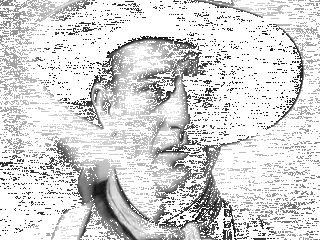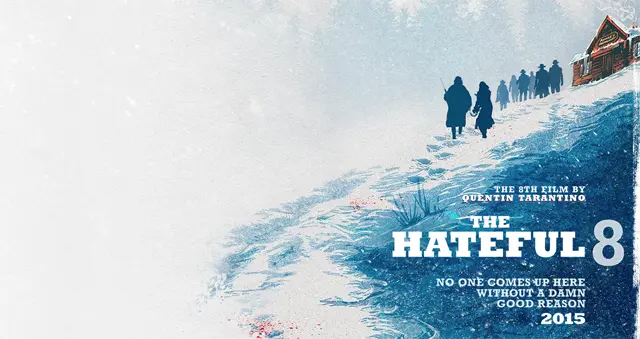Author: Nathan Chazan
The Hateful Eight is showing Thursday – Friday April 14 and 15 at 9:30, and Saturday April 16 at 9:00 at Cornell Cinema. For advance tickets, go to http://cornellcinematickets.universitytickets.com/user_pages/event_listings.asp
The Hateful Eight, the latest film from celebrated (and celebrity) director Quentin Tarantino is playing this weekend at Cornell Cinema. Although announcing itself as a descendant of the Spaghetti Western, the film’s two cinematic touchstones actually precede and follow that genre’s heyday – John Ford’s 1939 prototypical western Stagecoach and John Carpenter’s 1981 horror classic The Thing. The two films are played against each other in the film’s narrative, the former swallowed by the latter. Through this, Tarantino draws out and makes explicit the latent racial tensions beneath the surface of the American mass entertainment which the film deliberately recalls.

The first half of the film is all about Stagecoach, bringing a couple of strangers together to a common destination on a literal stagecoach journey. However, all the roles are twisted. John Wayne’s outlaw Ringo Kid is inverted by Kurt Russell’s bounty hunter John Ruth, notably the first character we see in the stagecoach rather than the last. As in Big Trouble in Little China, Russell’s Wayne impression suggests an old-time Hollywood audience surrogate and then explodes it, revealing his alpha-male romantic hero lost in a situation he cannot understand. Ruth’s captive is Daisy Domergue, a notorious criminal analogous to Wayne’s love interest in Stagecoach, portrayed with crude gusto by Jennifer Jason Leigh as a foul-mouthed, unapologetic bigot. The Southern gentleman is replaced with Walton Goggins’ proudly racist former Confederate soldier.
All this tension, confusion, and yes, hatred is kept front-and-center by the presence of a black man, the bounty hunter Marquis Warren (Samuel L. Jackson), a figure that is simply not found in John Ford’s white American nostalgia. Warren’s very presence among this lot is a source of obvious discomfort among even the most nobly-intentioned of characters. Tarantino does not want us to forget for a second that Ford was one of the Klansmen in Birth of a Nation. The presence of Stagecoach and the presence of racism are deliberately intertwined.

The stage coach’s arrival at Minnie’s Haberdashery mirrors a similar interlude in Stagecoach. However, at this point Stagecoach drops away and we enter the world of The Thing. Trapped by adverse weather, the men’s mistrust for one another grows, and after a death it becomes clear that someone there, as Russell’s character states, “is not who he says he is,” but rather is in cahoots with Domergue’s gang. The fear and suspicion, bottled up to a boiling point in an enclosed space recalls the nightmarish paranoia of The Thing. This is emphasized by the occasional quoting of that film’s soundtrack, also by this film’s composer, spaghetti western legend Ennio Morricone. In this reading, Leigh’s Daisy Domergue is essentially the thing from The Thing, a wicked allusion to the noticeable absence of women in the 80s American chillers that Carpenter’s film exemplifies. However, Tarantino is clearly far more reverent of John Carpenter than Ford, bringing Carpenter’s ethic of tension and ferocity to what is certainly the leanest three hour film in theaters now.

Between all this is Samuel L. Jackson’s wildly inflammatory monologue, a scene which most viewers of the film are likely to come away with strong feelings about. This is a rare, genuine confrontation of the viewer. Did he really do that? Are we supposed to approve of this vengeance? The Hateful Eight attacks our assumptions and rubs the racial anxieties of our culture right in our faces while remaining mean, fun, visually sumptuous entertainment. That the the film’s story is not “about” racism only makes its critiques all more brutal, the trick of the spaghetti westerns that Tarantino adores. For whatever my opinion’s worth, this is one of the most important films of the decade so far and I’d hate for you to miss it.













